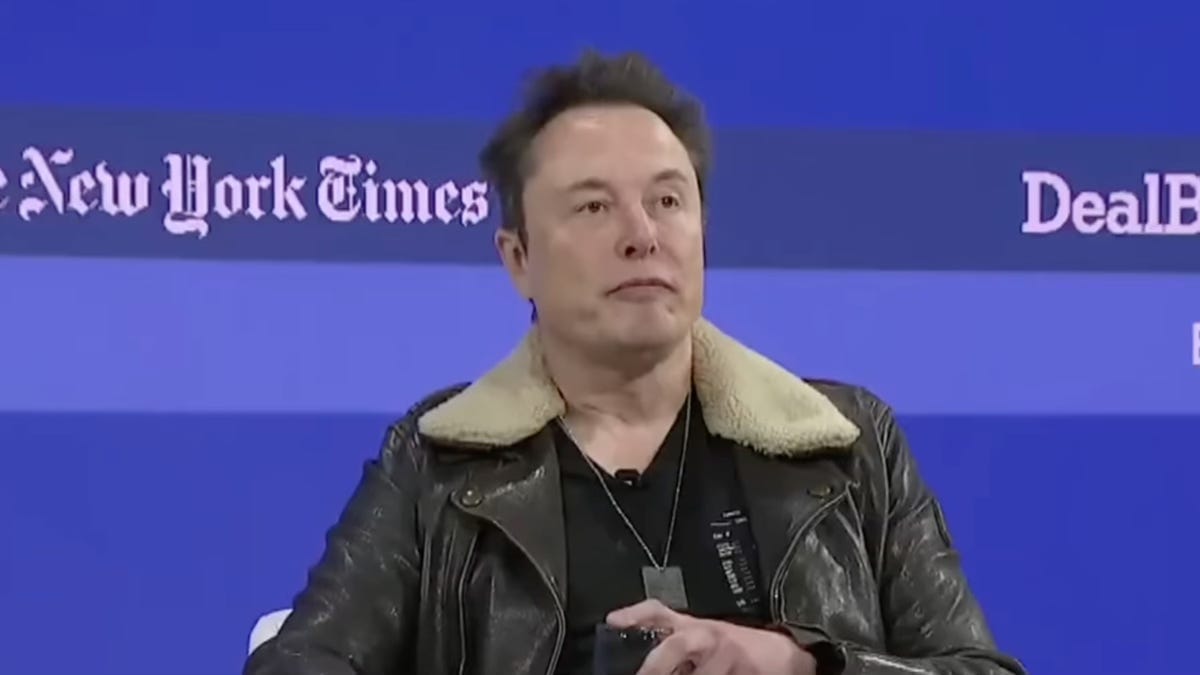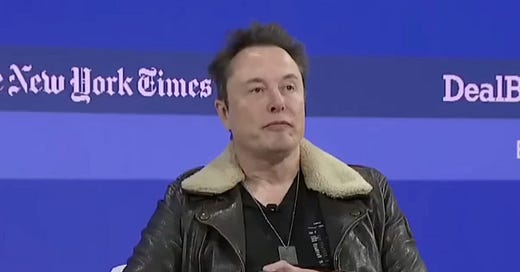Elon Musk built his own reality. Now it's consuming him.
We're all at risk as his fall from grace accelerates

Elon Musk looked dreadful when he took a seat beside host Andrew Ross Sorkin at yesterday’s New York Times DealBook Summit, but that was hardly the most newsworthy detail to come out of their conversation. As Sorkin tried to ask about Musk’s trip to Israel1 and the criticism that it was part of an apology tour to make nice after agreeing with some deeply antisemitic tweets, Musk abruptly cut him off when he mentioned the advertiser boycott.
“I hope they stop,” Musk said. “Don’t advertise.” Sorkin, taken off guard, asked for clarification, which the richest man in the world was happy to give. “If someone’s going to try to blackmail me with advertising, blackmail me with money? Go fuck yourself!” The audience made some uncomfortable murmurs and Sorkin seemed unsure how to continue, so Musk made sure they’d heard him, repeating those three words louder and more slowly, before making a direct shout out to Disney CEO Bob Iger, who’d appeared before Musk and whose company was among those that froze their ad spending on Twitter/X in response to the antisemitism scandal.
Musk has had a contentious relationship with advertisers since taking over the platform last October, but the DealBook interview takes his hostility to a whole new level. Back in May, he gave a chilling response to CNBC’s David Faber when asked about his decision to share conspiracy theories about George Soros, saying he didn’t care about the consequences; he wouldn’t be silenced. Now, he’s not only telling advertisers to fuck off, but threatening them if they follow through.
Elon Musk thinks he’s invincible
Instead of addressing Musk’s comment directly or taking him to task for the conspiratorial ideas he’s been spreading, Sorkin came at it from a business angle, asking what the consequences would be for Twitter/X if advertisers did desert the platform. To try to coax an actual answer out of Musk, Sorkin pointed directly at CEO Linda Yaccarino, who was sitting in the crowd and is supposed to be reviving the ad business. But it didn’t make much difference to Musk.
“What this advertising boycott is going to do… it’s going to kill the company,” Musk said, before continuing with what sounded like a threat. “The whole world will know that those advertisers killed the company, and we’ll document it in great detail.” When Sorkin countered that others would argue Musk is killing the company, he replied, “Well, let’s see how Earth responds to that.”
Everyone knows Musk’s following has swelled with vile (and sometimes violent) people on the extreme right since taking over Twitter and continually echoing their political positions. With that comment, he’s warning advertisers that if they pull their ads, he’ll send his attack dogs after them — whatever the consequences. Musk is serially unable to take responsibility for his actions, and this is just the latest example. In his mind, if Twitter dies it won’t be because he’s an incompetent executive who got in over his head and is turning off most users with his drift into conspiratorial politics, but because the (probably “woke”) advertisers are boycotting his platform.
At a deeper level though, this is all happening because Musk was able to craft his own reality. For years, he was able to weave the tale that he was a genius building the future and saving the world in the process — and the media not only participated, but helped amplify the claims. We’re now dealing with the consequences: a man who bullshitted so much he bought his own lies, and now that most everyone around him is waking up to that reality, he can’t deal with it so he’s retreating into a world of his own creation.
Making Elon Musk
Elon Musk is a man, as well as a character. But over the years the character has consumed the man, to the point that it’s probably hard to find the real Elon below the facade he’s built up over the course of many decades. As I’ve detailed in a previous piece, when you dig into Musk’s history, you clearly see how crafting a persona was a deliberate act by a man who wanted to become an entrepreneurial celebrity in the mold of Richard Branson or Steve Jobs. It’s fair to say he’s eclipsed them both, in part because he was even more shameless.
Keep reading with a 7-day free trial
Subscribe to Disconnect to keep reading this post and get 7 days of free access to the full post archives.




